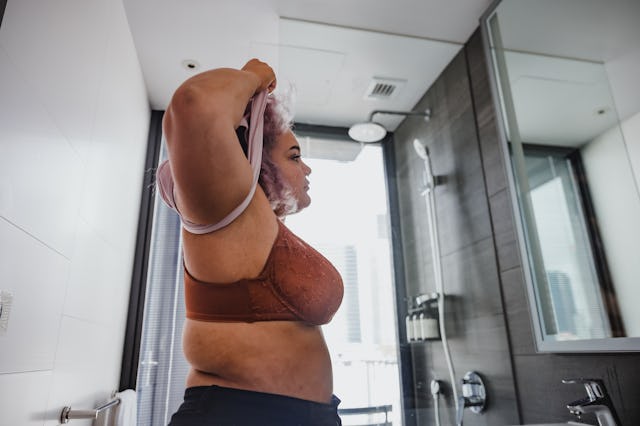Why Are My Nipples So Itchy?
And how exactly are we supposed to scratch them?

An itchy body part is always an inconvenience, but an itchy nipple? Dear Lord, there are few things worse. Unlike an itchy elbow or even a foot, it’s hard to subtly scratch your nipple without everyone noticing, and if you’re wearing a bra and a top, forget it. It’s not like you can exactly relieve that itch, you know?
But while skin that’s exposed to the elements or body parts that are sweaty from something specific — like an itchy foot after a day of walking — makes sense, an itchy nipple is not only inconvenient, but it just feels wrong. Your nipples are pretty much secured and hidden away most of the time, so how exactly are they getting itchy?
Well, like the rest of your skin, your nipple can absolutely deal with things like dry skin, friction from clothing, sweating, hormonal changes, or even certain laundry detergents, says Dr. Hannah Kopelman, dermatologist at DermOnDemand. “Occasional nipple itchiness is common and often nothing to worry about,” she tells Scary Mommy, adding that the skin on and around your nipple is also pretty sensitive, so having mild inflammation or irritation is normal. “In many cases, using a gentle, fragrance-free moisturizer, switching to a milder laundry detergent, or wearing softer, breathable fabrics can make a big difference.”
Dr. Paul Rosenberg, head plastic surgeon at New Jersey Breast Reduction Center, agrees, telling Scary Mommy that while most itchy nipples can be attributed to something like soap drying out the skin, menopause could also be the culprit. “Some perimenopausal patients complain of itching due to this underlying cause, and hormone replacement often diminishes the symptoms, as does external moisturizing. On occasion, patients taking medications used to treat acne — such as Accutane — can result in a generalized decrease in the natural oils released by the body, and the resultant dryness can cause itching,” he says.
However, if your itchy nipple persists and doesn’t seem to improve with any changes — such as new fabrics or different laundry detergents — or is accompanied by other symptoms, it’s worth consulting your doctor. “Red flags I tell patients to watch for include persistent redness, scaling, crusting, discharge — especially bloody, or changes in the skin texture like thickening or puckering. These could suggest conditions like eczema, a fungal infection, or in rare cases, something more serious like Paget’s disease of the breast, which is a rare form of breast cancer that can start with nipple changes,” says Kopelman.
Rosenberg says Paget’s is typically associated with “redness and sometimes with discharge from the nipple, which may or may not be blood-tinged. There is often wrinkling or dimpling of the skin associated with this condition, which definitely warrants evaluation by a qualified physician. The appearance of the breast skin is described as a peau d’orange, or an orange peel left in the open for too long that becomes wrinkled — the “skin of an orange.”
If you aren’t experiencing any of those symptoms, though, try not to panic. Rosenberg says that unlike breast masses, changes or dimpling in the skin of the breast or areola, or lumps in the armpit, “itchy skin of the breasts is typically not a sign of underlying pathology or cancer.”
Breast implants older than 20 years may also cause an itchy breast sensation as a sign of implant rupture. For adolescents whose breasts are still developing, an itchy nipple (often felt “inside” the breast, Rosenberg says) could be a result of body changes and growth.
But for the most part, if your nipple is itchy, it’s going to have a benign cause that you can easily manage. “Immediate relief can be obtained by placing a cold or cooled wet washcloth upon the area,” says Rosenberg. “More definitive treatments include absorbent powders if moisture and fungus is a causative factor, as well as anti-fungal creams and sprays. If these remedies do not work or do not last, evaluation by a qualified physician should be the next course of action.”